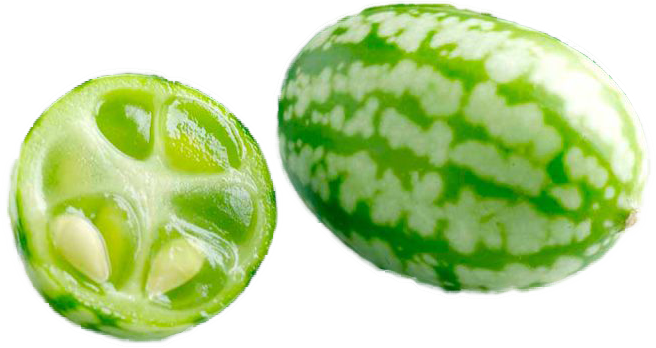|
Cucamelon
|
 |
|
|
|
Cucamelon, also
known as a mouse melon or Mexican sour gherkin, can be eaten on its own,
pickled or used in salsa. The sour fruits grow on a thin vine and are
surrounded by leaves that look similar to ivy and drop to the floor when ripe.
Its a Central American delicacy that’s been eaten in Mexico for centuries. The Cucamelon
seeds, have been reproduced in Holland. The plants are very fast growing, it
takes about three months to bear fruit and they are very adaptable. Sharples
says they can be grown outside in southern England but would need to be in a
greenhouse further north, they thrive in various soil types and are easy to
grow. They are the size of grapes, look like miniature watermelons and
taste of cucumbers and lime. The small fruits can be eaten on their own like an
olive or other snack. You can pickle them, chop them up into a beautiful salad
or create a fresh salsa. But we kind of like the idea of spearing one of the
adorable fruits and placing it in a martini.
The plant grows into beautiful vines and creates a large bounty of bite
size melons that are easier to grow than regular cucumbers. Even better, they
are resistant to drought, happy to grow outside and pests stay away. Similar to
the cucumber, these plants produce both male and female flowers. These plants
can fertilize themselves, but the flowers are not self-fertile.
Flowers are small and yellow, about four millimetres in diameter. Fruits
develop at the base of the female flower. It has been a staple of Mexican and
Central American diets since pre-Columbian times, hence its great array of
names in indigenous languages. These people also use the melon in
non-culinary ways, including in medicine.
|
|
Health benefits
|
|
Fruits are low in
calories and fat and are a source of simple sugars, fibre, and vitamins, which
are essential for optimizing our health.
It contains no saturated fats or cholesterol. Cucamelon peel is a good source
of dietary fibre that helps reduce constipation, and offers some protection
against colon cancers by eliminating toxic compounds from the gut.
It is a very good source of potassium, an important intracellular
electrolyte. Potassium is a heart friendly electrolyte; helps reduce blood
pressure and heart rates by countering effects of sodium.
Fruits health
benefiting properties are because of their richness in vitamins, minerals,
micro-nutrients, anti-oxidants, which helps the body prevent or at least
prolong the natural changes of aging by protecting and rejuvenating cells,
tissues and organs.
|
|
|
|

